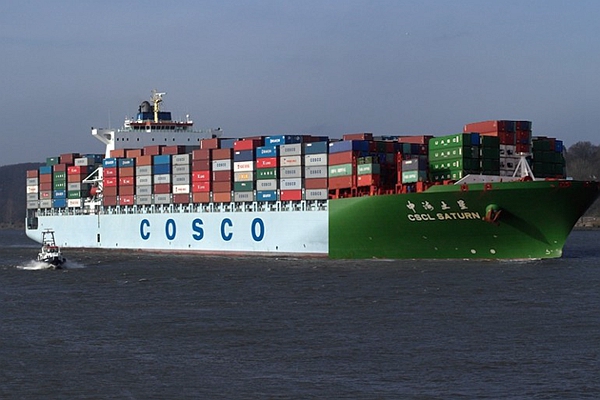COSCO Shipping's Mediterranean strategy
- By George N. Tzogopoulos
 0 Comment(s)
0 Comment(s) Print
Print E-mail China.org.cn, August 2, 2017
E-mail China.org.cn, August 2, 2017
|
|
|
COSCO Shipping [File photo] |
With China energetically implementing the Belt and Road initiative, new maritime routes are gradually developing. The potential for additional business deals and investments is huge and the international interest in China is increasing.
In that regard, COSCO Shipping, created last year after the successful merger of COSCO with China Shipping, is steadily expanding its international presence. Only a few days ago, Fortune Global 500 revealed its latest rankings, and with the Chinese company reporting revenues of $29.7431 billion, it rose 99 places to the 366th position.
Although COSCO Shipping is employing a global business strategy in its attempt to increase profitability and world standing, the Mediterranean constitutes an area of special interest.
There are various countries and ports where it has been active or intends to invest. In Egypt, for instance, the Chinese company owns a 20 percent stake in the Suez Canal Container Terminal at Port Said. When the deal was signed 12 years ago, the official announcement focused on its location “on the shipping lanes of all the major lines to and from Asia/Europe via the Mediterranean.”
Moreover, in Greece, COSCO first entered Piraeus in 2009, gradually transforming it into a hub in the Mediterranean. Prospects for the future are even brighter taking into account that the Chinese company acquired a majority stake of the Piraeus Port Authority last year.
New plans include Chinese investment in cruise, logistics and ship-repair zones. Last month, the Shanghai International Port Group, which manages 25.7 percent of China's international trading volume, signed memoranda of cooperation with COSCO Shipping and the Piraeus Port Authority in the presence of Han Zheng, a member of the Political Bureau of the Central Committee of the Communist Party of China.
COSCO Shipping is also active in Turkey. Specifically, in 2015 it entered a joint venture with two state-owned enterprises, namely the shipping firm China Merchants Holdings International and CIC Capital to buy 65 percent stake of Kumport Terminal in the Port of Ambarli.
Kumport is the third largest container terminal in Turkey, while the Ambarli Port Zone on the northwest Marmara Sea, a strategic location at the junction in the Eurasian region. The terminal is only 35 km from the Bosporus Strait, a gateway to the Black Sea through which all shipping from there must pass.
COSCO Shipping is also investing in the port of Vado, located in north-western Italy in the region of Savona on the Ligurian Coast, near Genoa, the country's busiest container port. In particular, in October 2016 it acquired a 40 percent stake in Vado Holding.
According to the press release of APM Terminal, which still holds a 50.1 percent stake, the agreement includes an interest in both the existing Reefer Terminal in Vado, the largest refrigerated cargo facility on the Mediterranean Sea, and the new 800,000 TEU capacity deep-water terminal currently under construction.
Finally, China Shipping is active in Spain. Only a few weeks ago, it reached a deal for a 51 percent stake of Noatum Port, a Spanish container terminal operator in the ports of Valencia and Bilbao. Valencia is the main gateway to the Iberian Peninsula and the natural port of Madrid, while Bilbao is one of the largest and most modernized container terminals in the Atlantic region of Southern Europe, serving as an ideal gateway for container shipping to the Iberian Peninsula and Southwestern France.
COSCO Shipping sees the Spanish business agreement as a significant way for it to further improve its overseas port network as well as to strengthen the control and management of its ports and terminals.
The company is not only engaged in the construction, development and management of ports but is also fostering global connectivity. Direct container services of COSCO Shipping link bigger and smaller ports of the Mediterranean. A significant example is the Adriatic Greece Turkey (AGT) Feeder.
Last April the Chinese company launched new shipping lines connecting Northern Europe with the Mediterranean. On that basis, China Shipping promotes its technical expertise and know-how in the Mediterranean by using its liquidity to practically demonstrate to Mediterranean countries how “win-win” results are produced.
George N. Tzogopoulos is a columnist with China.org.cn. For more information please visit:
http://www.china.org.cn/opinion/GeorgeNTzogopoulos.htm
Opinion articles reflect the views of their authors, not necessarily those of China.org.cn.







Go to Forum >>0 Comment(s)